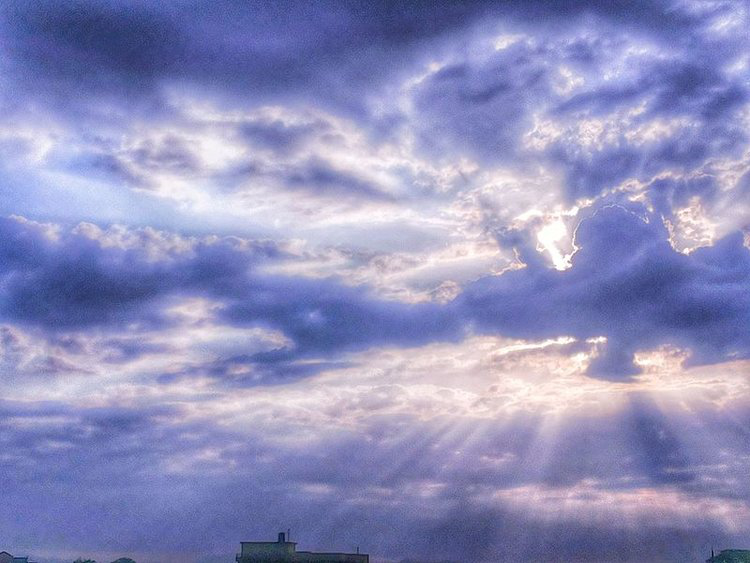Astrology's primary theoretical suggestion is that life reflects the cosmos, as above so below. Anything born at a specific moment develops, culminates, decays, and dies in synch with the persistent motion of the planets. Not just human life, but the life of humanity's creations--its ideas, innovations, and civilizations, all endure and expire beside the churning of the sky. The most primordial and easily observed of these cycles is that of the Moon, which begins and ends its cycle within roughly one month.
The New Moon begins the cycle at the conjunction of Sun and Moon, culminates at the opposition (the Full Moon), ending and starting again at the following conjunction/New Moon. And between these new and full phases, exist symbolic points of tension, struggle, and crisis--the waxing square (between new and full) and the waning square (between full and new). These four primary aspects are known technically as quadrature axial alignments, and they occur between all planets and objects in the sky.
In our theory of astrology, the dynamic aspects of planets correlate with specific archetypal themes which emerge in both personal and cultural shifts. These four quadrature axial alignments became the focus of astrologer and historian Richard Tarnas' monumental work, Cosmos and Psyche: Intimations of a New World View. Before the accessibility of personal astrological software, Tarnus painstakingly studied the cycles of the outer planets and their correlation with history.
In Cosmos and Psyche, Tarnas observed that peaks within cycles involving Uranus, Neptune, and Pluto correlated with poignant sociopolitical shifts and changes. He noted, for example, how the counter-cultural revolution and the American/Russian space race of the late 1960s (culminating in the Moon landing in 1969), correlated with the rare conjunction of Uranus and Pluto, occurring once every 100 some years. That same Uranus/Pluto cycle, Tarnas noted, correlated with the birth of the scientific revolution through the publication of mathematician/astronomer Nicolaus Copernicus' De Revolutionibus under a Uranus/Pluto opposition in 1543.
Another dynamic cycle featured in Tarnas' book was that of Saturn and Pluto, two planets set to conjoin in tropical Capricorn in early 2020. It's been over 500 years since Saturn and Pluto last conjoined in Capricorn, but their conjunctions occur every 31 to 37 years in different zodiac signs. Much like the New Moon in the lunar cycle, Saturn and Pluto will begin a new development in 2020, bringing an end to the previous cycle which opened at the conjunction in the early 1980s.
In Cosmos and Psyche, Tarnas stresses that astrology is archetypally but not concretely predictive. In other words, astrology cannot explicitly predict the future, but it can predict the future's archetypal resonance. I won't be making those kinds of concrete predictions that you might imagine when you think of astrology. We're going to explore the current moment from an archetypal vantage point drawing on some notable historical correlations.
Astrology is not very good for telling you exactly what will happen in definitive, concrete terms. Archetypes, as Tarnas also beautifully demonstrated in his book, have an inherent multivalency. Archetypes can manifest within a varied range of possibilities. So while it's possible to look at past cycles and find similarities to the present, it's impossible to know which of those previous manifestations will occur for certain.
I highly suggest reading Tarnas' Cosmos and Psyche if you're interested in this topic. I can only cover in a general manner what is an incredibly complex subject. I'm going to explore how this aspect might show up, especially in the United States which is approaching its 2022 Pluto return alongside the exact Saturn/Pluto conjunction in early 2020. And we'll also consider the Saturn/Jupiter conjunction in late 2020.
Tarnas suggests using an orb of 15 degrees on either side of an aspect when looking at historical correlations. In using this wider orb, the approaching Saturn/Pluto conjunction encompasses the time between January 2018 through December 2021.
The aftermath of the 9/11 attack on the Twin Towers in New York City, Photo credit: 9/11 photos on Visual Hunt, via Wikimedia Commons.
As mentioned, the conjunction phase is one point within the various quadrature axial alignments of Saturn and Pluto. Dynamic Saturn/Pluto periods also occur at the square and opposition phases. While the last conjunction occurred in the early 1980s, the most recent Saturn/Pluto periods occurred at the opposition (June 2000-April 2004) and the waning square (Nov. 2008-August 2011). Several notable events occurred within these time bands. Under the opposition period from 2000-2004 were the September 11, 2001 attacks on the World Trade Center and Pentagon, as well as the subsequent US-led invasion of Iraq in 2003.
Under the next square, the global financial crisis erupted in the years 2007-2008 at the brink of the Saturn/Pluto square (2008-2011). In Cosmos and Psyche, Tarnas describes quadrature axial alignments of Saturn and Pluto as "cycles of crisis and contraction." Throughout history, we see evidence of the Saturn/Pluto cycle correlating with periods of economic austerity, conservative empowerment (on a global scale), disease pandemics, the start of wars, and sometimes the rise of fascist/totalitarian powers and ideologies.
Saturn and Pluto also correlate with these same themes emerging in culturally significant art and literature, such as several famous works of dystopian fiction. It was at the tail end of the previous Saturn/Pluto conjunction, in the spring of 1984, when author Margaret Atwood wrote The Handmaid's Tale while residing in West Berlin, seven years before the fall of the Berlin Wall.
Atwood's novel takes place in a near-future New England when environmental ruin and a pandemic of infertility spawns a conservative revolution which effectively suspends the US constitution. The empowerment of a brutal totalitarian regime, resembling a theonomy (a hypothetical Christian government, ruled by divine law), forces the sparingly fertile women to serve as handmaids for the elite, bearing children in service for humanities' preservation. Women are forbidden from reading and writing, and stripped of their rights to hold property and handle money.
Gay men, dissidents, and those refusing conversion to the state religion are executed, their bodies hung along public walls. Those considered “non-persons” such as sterile, unmarried women, feminists, and lesbians are sent to the "colonies" to clean up radioactive waste until their death. Atwood's dire vision depicted a post-American, totalitarian government to osmose both Christian and puritanical overtones, true to the dominating ideologies which helped shape the construction of the American empire.
Interestingly, the Handmaid's Tale has reached its first Saturn return since its publication in 1985, regaining popularity over thirty years later as a Hulu original series with two seasons and a third currently in production. In the midst of the Trump administration, Atwood’s novel feels chillingly pertinent to our current times, a compelling warning of how in moments of crisis or collective frustration, extremely conservative ideologies can rapidly gain dominance.
George Orwell's dystopian, sci-fi classic, 1984 (the year Atwood wrote The Handmaid's Tale), was written under the Saturn/Pluto conjunction in 1948, the same cycle that correlated with the initiation of the Cold War. Aldous Huxley wrote A Brave New World from May to August 1931 under a Saturn/Pluto opposition. Based in a futuristic "negative utopia," as Huxley described it, A Brave New World also presented a frightening vision of the future, written as a parody of H.G. Wells' more optimistic, utopian novels of the early 1900s.
The original Guy Fawkes mask used in the film adaptation of V for Vendetta; photo by Enrique Dans from Madrid, Spain
V for Vendetta, a British graphic novel written by Alan Moore, was originally published as a multi-part series starting in 1982, under the last Saturn/Pluto conjunction. The iconic "Guy Fawkes mask," worn by the novel's protagonist, V, has become a global symbol of revolt against tyranny, mostly through its ubiquitous use within the hacktivist community, Annonymous. The story depicts a dystopian, near-future United Kingdom set in the 1990s, where a fascist, police state takes control proceeding a nuclear war. It gained global popularity after the release of its film adaptation in 2006.
Saturn, Pluto, and Capricorn Archetypes
Untitled, known as Saturn Devouring His Son, Devoration or Saturn Eats His Child by Francisco Goya
In astrology, an essential archetypal quality of Saturn is that of preservation, as well as endurance within the midst of extreme hardship or austerity. Pluto, the God of the underworld, invokes the darkest depths of the planets it contacts, revealing the underbelly and repressed, unconscious motivations. Pluto appears to empower the planets it touches, morphing their expression into sometimes inflated caricatures beyond normal bounds.
Pluto also relates to the principle of entropy and regeneration. Pluto brings about transformation, sometimes through a descent into the unconscious, or through the volcanic eruption of repressed psychic contents. When Pluto is active in collective or personal events, an old order dies and falls away, and a new way of life emerges from the debris. In this sense, Pluto's archetype is destructive, but sometimes, destruction is necessary for the seeding of new life.
Saturn represents the archetype of time which derives from its earlier Greek title, Kronos (or Cronus/Cronos), the God who devoured his children to prevent his dethronement. For both the Greeks and Romans, the Saturn/Kronos association with time reflected the observation that time eventually devours all things, and thus Saturn's archaic associations with the passing of seasons and agriculture. Saturn invokes the qualities of restraint, maturity, and death, just as the flow of time leads to the inevitable transitions of each stage of life.
Saturn, Internet Archive Book Images, via Wikimedia Commons
Saturn presents limitations, challenges, and necessities; it seeks to preserve authority, traditions, structures, and conventions. Saturn can actively work against progress; it is the impulse for control of instinct and chaos, seeking to provide strict or harsh securities, boundaries, and divisions. It can present us with seemingly insurmountable barriers, yet also the opportunity to fortify strength, willpower, persistence, and autonomy.
As Pluto conjoins Saturn in the coming few years, we will experience a dramatic amplification of the above-mentioned Saturnian archetypes within the collective psyche, as well as a glance into their darkest or most terrifying manifestations. This current period is thus a moment of a leviathan-like Saturn, a time when we will witness an extreme boost of conservative dominance and the collective need to strengthen and solidify boundaries physically, culturally, and politically.
As an added layer, Saturn and Pluto will conjoin in Capricorn, where the Sun initiates the winter solstice each year in the northern hemisphere. Saturn and Pluto in Capricorn resonate with the archetypal dark, cold, and precarious winter. In the traditional, western astrological system, Saturn is the ruler (or lord) of Capricorn, and its placement here technically empowers Saturn's power and expression.
15th century depiction of Capricorn, from Medieval book of astrology, via Wikimedia Commons.
Capricorn, much like Saturn, is the archetype of authority and elderhood, and in its darkest face, what astrologer Steven Forrest calls the "crushing patriarch." Both Capricorn and Saturn symbolize systems and structures which seek to preserve their dominance at any cost, just as Kronos ate his children to avoid being deposed. The shadow of Capricorn is the oppressive autocrat or controller who exploits crisis and breakdown to acquire leadership.
Indeed, throughout history, it is in times of crisis, hardship, and uncertainty, that autocrats have gained control by enticing the desperate and fearful populace with the promise of restoring convention and offering protection from the unknown. And the contracting aspect of Saturn/Pluto alignments so often manifest as a collective yearning for regression, to restore society to an idealized, past era of simplicity, stability, and control.
Such was the case in 1930's Germany with the rapid ascendency of Nazism and the start of Hitler's dictatorship under the Saturn/Pluto opposition of 1930-1933. Or in Italy, under the fascist dictatorship of Mussolini during the Saturn/Pluto square 1921-1923. That same cycle correlated with Stalin's seizure of the Communist party in Russia, and Hitler's momentary prison time in which he began writing Mein Kampf, the ideological vision which would, at the following Saturn/Pluto alignment, enrapture the nation of Germany.
Jupiter/Saturn Conjunction 2020
While there's a unique archetypal quality to the peaks within the Saturn/Pluto cycle, it does not occur in a vacuum. The ever-changing sky correlates with the uniqueness of every moment. However, many cycles overlap which can create similarities within specific historical periods.
A unique feature of the previous conjunction of Saturn/Pluto in the 1980s was its correlation with Jupiter's conjunction with Saturn in air sign Libra. In 2020, Jupiter and Saturn will conjoin in Aquarius, another air sign, drawing a parallel to the early 1980s. The Jupiter/Saturn conjunction is a complex topic unto itself; however, it's important to mention because of its historical correlations with economic and social upheaval.
The Jupiter/Saturn conjunctions occur in the same element for roughly two centuries. From 1802-2020, the Jupiter/Saturn conjunction occurred in earth signs. The 1980s saw the first shift of Jupiter/Saturn into air sign Libra. But the following conjunction went back to earth, with Jupiter/Saturn conjoining in Taurus in May 2000. The transition of the Jupiter/Saturn conjunction from one element to another is called a Grand Mutation which has been underway from late 1980-late 2020.
Many astrologers point to the development of the internet and accompanying technologies within this period as meaningful correlations with the Jupiter/Saturn Grand Mutation into air signs. Indeed the air archetype relates symbolically to the mind, communication, and connection. The internet explosion of the 1990s led the way to a rapid acceleration of communicative technologies that connected the world in ways hardly imaginable at the brink of the 1980s.
We are likely to see the genesis of another major socioeconomic shift under Saturn's conjunction with Jupiter in 2020. Jupiter/Saturn conjunctions represent a fusion of tradition and innovation, the melding of antagonistic desires--to maintain the status quo and yet to seek freedom from it simultaneously. These are periods where traditional systems, methods, and approaches are forced into reformation.
Similar even to the backdrop of WWII, during the Saturn/Pluto opposition and Jupiter/Saturn conjunction in earth sign Virgo, the 2020s is likely to be a highly precarious and uncertain period which paves the way for a new social and economic order. With Jupiter and Saturn conjoining in Saturn's domicile sign of Aquarius, we still get a powerful Saturn dominating over Jupiter. Symbolically, the expansiveness of Jupiter must contend with Saturn's limiting nature.
However, Aquarius is symbolic of the "outsider's perspective" and the desire to achieve independence and autonomy. This conjunction is likely to correlate with economic and political policies emerging from previously alienated voices and minds, as well as the desire for liberation from the constraints of the past. It may be the outsider's perspective as well as the collective yearning for independence, that drastically changes the social and economic landscape over the next 20 years. So, what might crumble in the wake of this socioeconomic revolution?
The last two centuries of Saturn/Jupiter conjunctions in earth signs correlated with the industrial revolution and its ramifications. The shift from earth to air has dramatically shifted the collective focus from the shaping of material empires to those of the mind--an elevation of systems and structures from the land to sky.
The internet revolution unleashed several social and economic structures from the limitations of physical space. Consider the storage of mass amounts of data and information onto "cloud networks," or how much of our daily life revolves around smartphones and wifi signals. Jupiter and Saturn's conjunction in Aquarius begins the next two centuries of conjunctions solely in the air element and in a sign associated with innovation, ingenuity, and independence, this is likely to begin a revolutionary social and economic shift.
The Aquarian archetype represents the other face of Saturn since it is Saturn's second ruling sign. While Saturn in Capricorn is the conservative face, Aquarius is more progressive and freedom-seeking. It is indeed a critical requirement of growing up that we claim independence and freedom from the structures, beliefs, and dependencies of the past. One cannot become an adult without a necessary phase of individuation, often through defiance or rejection of the formative life.
In true Saturnian fashion, that process of differentiating ourselves from the past is often painful and scary. It suggests willingly abandoning familiarity for the acquiescence of autonomy. Usually, there is a need to dissociate or even alienate oneself from family, society, and culture to find one's unique way in the world. The developments spawned under the Jupiter/Saturn conjunction in Aquarius are likely to carry this theme of strengthening independence and throwing out old beliefs, ideologies, and theories that no longer work.
On the economic level, we could witness the crumbling of the individual's dependency on physical institutions and constraints. While the 2020 period of Saturn/Pluto's conjunction will likely be constraining, Jupiter and Saturn's conjunction beyond it will help to offer up new solutions which can lead to fresh approaches to managing the economic, social, and political challenges. In that sense, the Jupiter/Saturn conjunction provides a bit of hope in a moment of darkness.
If we look back at the early 80s, we note the rise of a little-known, economic and ideological development that came to dominate the world, Neoliberalism or economic liberalism. We also see a similar wave of conservatism and greater appeal for populist, political leaders. As mentioned, the simultaneous occurrence of Saturn/Pluto and Jupiter/Saturn in the 80s creates an interesting parallel to the approaching time-period, and thus we are likely to see some similar themes and trends emerge.
Neoliberalism & Corporate Dominance
Ronald Reagan at the Arrival Ceremony for State Visit of Prime Minister Margaret Thatcher of the United Kingdom, by Jack Kightlinger (Official White House photographer), via Wikimedia Commons.
As Saturn and Pluto were approaching notable orb of conjunction in 1980, Ronald Reagan was elected president of the United States. As is often the case with Saturn/Pluto alignments, Reagan rode a wave of rising conservatism within the nation. The same was true in the United Kingdom, with Margaret Thatcher, leader of the UK Conservative Party, winning the United Kingdom general election in May 1979.
Both Reagan and Thatcher heavily glorified the free market, and equally promoted the idea that businesses, instead of the government, could better serve the needs of the people. The 1980s saw the rise of the corporate world and its dominance over many facets of society. The injection of advertising and product placement in editorials became standard practice. It was a decade when corporate interests would begin their tacit manipulation of the free press. Today, we can connect the enmeshment of corporate lobbyists and elected representatives directly to the policy changes of the 80s era.
It was Reagan and Thatcher, along with libertarian economist, Milton Freidman, who significantly popularized Neoliberalism, which has since become the predominant economic and political ideology across the world. During this time, with the help of corporate advertising, market research, and rampant polling, US and UK culture were suddenly bewitched to prioritize the satiation of public desire above anything else. Proponents of Neoliberalism suggested that excessive government involvement promoted enormous waste, stagnation, and inefficiency, and thus welfare was shunned in favor of empowering privatized corporate dominance.
By Alejandro Alvarez, via Wikimedia Commons
The 1980s saw a building rejection of government regulations and high taxation, resulting in deep tax cuts for the rich and corporations, under the belief that the wealth would "trickle down" and thereby boost the economy. This lead to a massive wealth transfer from the poor to the rich that surged wealth inequality not just in the United States, but across the globe. By the mid-1990s, the wealthiest 1% of the American population held 40% of the nation's wealth, double the share from twenty years prior. Today, as we approach the next Saturn/Pluto conjunction, the top 1% own more wealth than the bottom 90%. And working wages haven't increased since.
The 1980's Saturn/Pluto conjunction was, economically speaking, a great time for big businesses and the wealthy (the Saturnian structures themselves), but not so much for the working class. Do we see any parallels today? In the United States, the new GOP tax plan has continued the same Neoliberal ideology that was given a boost under Reagan and Thatcher, resulting in the most significant corporate tax cut in US history.
But Neoliberalism isn't solely a right-wing ideology. It first took root under US president Jimmy Carter and UK Prime Minister John Callahan and has since become the dominant policy on both sides of the political spectrum. US president Bill Clinton effectively destroyed America's cash assistance programs through his welfare reform bill, The Personal Responsibility and Work Opportunity Reconciliation Act. Clinton's Neoliberal "welfare to work" rhetoric has been appropriated and rebranded today by the Republican party. In early 2018, Trump announced his plan to, “lift our citizens from welfare to work," echoing the Clinton era position against the welfare dependent.
Al Gore and Newt Gingrich applaud to US President Clinton during the State of the Union address in 1997, from White House Official Site, via Wikimedia Commons
Under the Neoliberal ideology, the economic plight of the homeless lies solely in their laziness or inability to take the initiative and better themselves. Negligent banking practices, privatization of social services, the complexities of human development, or institutionalized racism and violence are never to blame.
The Saturn/Pluto square of 2008-2011, under the US Obama administration, correlated with the shameful bailouts of the big banks and Wall Street, the very institutions responsible for creating the collapse through their reckless affair with stock derivatives and subprime mortgages. Working Americans were left with the burden of cleaning up the mess, costing taxpayers $21 billion in bailouts.
The US Financial Inquiry Commission, in its Jan. 2011 report, concluded that, "the crisis was avoidable and was caused by: Widespread failures in financial regulation, including the Federal Reserve's failure to stem the tide of toxic mortgages; Dramatic breakdowns in corporate governance including too many financial firms acting recklessly and taking on too much risk; An explosive mix of excessive borrowing and risk by households and Wall Street that put the financial system on a collision course with crisis; Key policy makers ill prepared for the crisis, lacking a full understanding of the financial system they oversaw; and systemic breaches in accountability and ethics at all levels."
Occupy Bank of America March 15, 2012, Occupy Wall Street targets BofA with a rally and march, by Mike Fleshman, via Wikimedia Commons
A recent report from the environmental non-profit group, the CDP, in collaboration with the Climate Accountability Institute, found that just 100 companies are responsible for 70 percent of global greenhouse gas emissions. Chevron, BP, Exxon Mobile, and Shell were implicated as the highest emitting companies since 1988. In the current crisis of global climate change, the blame unsurprisingly falls in the hands of corporate entities empowered by the tax cuts and subsidies from the nascent Neoliberal period.
At a moderated discussion at Rice University in Houston, former president Barack Obama boasted that his presidency was responsible for making America the largest oil producer in the world, stating that, "And you know that whole suddenly America’s like the biggest oil producer.…that was me, people."
Unregulated corporate power lies at the root of Neoliberalism, which has fueled globalization and the current environmental crisis. It's an ideology that has infected both sides of the political aisle, promoting the strangely skewed belief that the right of a company to make a profit is a higher priority than the needs of the people.
The 2008 global recession resulted in 1.2 million American households lost due to foreclosures and millions left unemployed. And yet, not a single Wall Street executive was prosecuted for their witting sale of toxic mortgages. It was the same unregulated corporate power that initiated the Great Depression in 1929, a result of laissez-faire economics, much the predecessor to Neoliberalism, just as Saturn and Pluto reached orb of opposition the following year.
Photo by Chopper Dave, via Wikimedia Commons
While Ronald Reagan was considered rather moderate when it came to his conservative politics, preserving Medicaid and Social Security as two examples, it was under his administration when homelessness would rapidly increase across the US. The closing of mental institutions throughout the country forced the mentally ill onto the streets. Today, with ever-increasing wealth inequality, the gentrification of major cities is spawning preternaturally, pristine corporate landscapes which push and displace the lower classes further to the margins of society.
With an ideology that promotes maximizing economic freedom no matter the cost, many find themselves beleaguered by a cold, harsh world where profits are placed over human compassion and welfare. Such is the nature of Saturn/Kronos when brought to its darkest and most frightening expression in the shadow of underworld ruler, Pluto. Under the approaching Saturn/Pluto and Jupiter/Saturn conjunctions, we can anticipate another significant chapter change in the evolution of Neoliberalism.
This moment in history represents the closing of the previous cycle, and yet the beginning of a new step. In contemplating the current situation, the next few years looks to be an extremely challenging period, especially for the poor, working class, and the economy. Saturn/Pluto alignments have shown to embolden corporations, the elite, and authoritarian leadership. The Trump administration is continuing the same Neoliberal ideology just as all administrations have since the late 1970s, and in that sense, it's business as usual.
We are likely to see, not just in the US, but across the world, political powers which seek to minimize government regulation and embolden private interests. It's now clear, after 30 plus years of Neoliberal dominance, that its effects are not working out for those at the lower rung of the economic ladder. Therefore, this period is likely to result in increasing civil unrest and frustration, as we've recently seen in France and spreading elsewhere, and the rise of populist leaders who attempt to empathize with the struggles of the 99 percent of non-elites.
By Umar Shahid, via Wikimedia Commons
The backlash from the struggling lower classes is bound to result in a tightening of oppression, control, and retaliation from governmental and corporate powers. As we look beyond the Saturn/Pluto conjunction and consider Saturn's conjunction with Jupiter, a new order will emerge from the outsiders--many geniuses, rebels, and the marginalized are likely to gain power and help shape new structures, and incredible technological innovations will help to catalyze that.
However, the dark side of this cycle, as I've discussed, is that so often, leaders exploit the suffering of the struggling to embolden their nationalistic and sometimes fascist movements. This appears to be a significant risk here in the United States especially, with the Saturn/Pluto conjunction touching the US Pluto alongside its Pluto return. The underworld is now emerging, forcing us to acknowledge the most unsettling and frightening aspects of American culture and its political/economic structures. Neoliberalism is likely to play a major role, reaching a demise or further elaboration. Astrology doesn't tell us which.
But the rising tide of nationalism and conservatism at this current juncture is something we should be wary of as the US approaches its presidential elections in 2020. Saturn/Pluto cycles are often periods of widespread, global backlash against progressive, social changes. Under US president, Ronald Reagan, there was a strong racially driven opposition against the effects of the civil rights movements of the late 60s. Many believed that blacks entering the workforce were jeopardizing job prospects for the white, working class.
Today, under the Trump presidency, similar rhetoric is heard, as many white, right-wing voters blame their economic hardships on immigrants and welfare programs, seemingly ignorant of the effects of Neoliberalism over the past three decades. Donald Trump's blatantly racist and misogynistic comments, his obsession with the construction of a border wall between the US and Mexico, appears to echo many of the trends which built momentum in the early 80s, though far more dangerous and extreme.
Crisis and Contraction
Reagan addressing the Annual Convention of the National Association of Evangelicals ("Evil Empire" speech), Ronald Reagan Presidential Library.
Another risk with this current Saturn/Pluto cycle is the synchronistic emergence of crisis. The 1980s saw the height of the Cold War, a time when Reagan declared the Soviet Union "the evil empire," similar to George W. Bush's "axis of evil" speech (under the Saturn/Pluto opposition of 2001-2004). Fortunately, the Cold War came to an end after the 80s era Saturn/Pluto conjunction and did not result in nuclear war.
As mentioned, the attacks on the World Trade Center occurred during the previous Saturn/Pluto opposition (2000-2004). It's clear that the events on 9/11 forever changed the political and economic landscape of the US, as well as the entire world, symbolic of the Saturn/Pluto archetypes, a transformation of the world order. In the midst of the 9/11 crisis, airport security checks hugely expanded, and many freedoms and liberties were restricted.
The implementation of the Patriot Act after 9/11 led to the construction of the behemoth surveillance state which has since collected mass amounts of private phone and internet data. The National Security Agency (NSA) spying campaign took on enormous and complex proportions, gathering not just the private data of Americans, but that of citizens abroad. The extent of the NSA spying program was leaked in June 2013 by Edward Snowden, under the Uranus/Pluto square, which as briefly discussed earlier, is much the antithesis of the Saturn/Pluto archetype.
Photo by Amada44, via Wikimedia Commons
But as was the case with the Cold War, the Saturn/Pluto conjunction can bring both beginnings and endings. As the current cycle has correlated with the vast spread of Neoliberalism across the world, we're likely to witness its failure and decline. However, as was the case with modern terrorism, said to have begun in 1946 under another conjunction of Saturn/Pluto, that crisis has worsened, inflamed and supported by corrupt, US foreign policies. The global AIDS crisis, which began under the last Saturn/Pluto conjunction in the 1980s, reached pandemic proportions in Africa under the Saturn/Pluto opposition in 2000-2004.
Promising new HIV treatments and preventions have recently become accessible, and so perhaps, we could see a decisive turning point in the AIDS narrative soon. However, a new disease pandemic is another possibility under the next wave of Saturn/Pluto, as was equally the case with the bubonic plague under the Saturn/Pluto conjunction of 1348-1351. But let us remember, astrology is archetypally but not concretely predictive.
We cannot, in looking at the conjunction alone, predict precisely what kind of crisis will erupt. Astrologer Robert Hand, writing in 2001 about the approaching Saturn/Pluto opposition, admitted that, "I would like to be able to give a definitive judgment about the likelihood or unlikelihood of war, but I cannot. I don’t think that astrology is capable of that." Based on the historical data alone, we can only speculate on the possibilities, such as Hand did in early 2001.
I would suggest, however, that given the past conjunction's correlation with the rise of Neoliberalism and the corporate world, there will be a dramatic change in our corporate and economic structures. And a crisis involving those structures is a high probability. Pluto igniting the US Pluto return in Capricorn in 2022, adds another layer of symbolic significance about an encroaching breakdown and transformation of US economic structures. How exactly this will play out, or what specific factors will lead to it, we cannot say. But the signs are already looming, and the shadow is erupting on the world stage.
Hope in Hard Times
Photo by MateeKhan, via Wikimedia Commons
Is there a positive side to the Saturn/Pluto cycle? First, we can look at challenges and even suffering as forces which sculpt formidable strength within individuals. Such experiences catalyze growth, action, and change. There is no life without pain. Indeed, pain is a requirement of being alive. We can reframe our view of the Saturn/Pluto cycle from a victim's perspective to a courageous acceptance of difficulty to add dimension to our experiences, or to provide the incentive for action and thus change.
From an evolutionary astrological view, life isn't all the product of chaos or chance. There is an intelligence guiding the flow of life, a fate to which we are in some way meandering our way through. With that said, are there not periods when we need to step back, conserve, even question previous advances? Is contraction always a bad thing? Can excessive liberalism at times become a problem, or can things progress too soon and too fast? While yes, the world stage appears to depict a hyper-inflated, cartoon version of astrological archetypes, often disconnected from the more profound wisdom or teachings of the planets, there is still perhaps a greater purpose to any difficult moment of life, even a purpose to a collective backlash against progress.
It is to that greater purpose I would encourage us to seek to embrace or understand, if only just to hold that intention with a sense of humility, of surrender to what we don't yet know or understand. In our personal lives, as it is in the collective, we can, through the acquisition of expanded consciousness, align ourselves with the mysterious, cosmic agenda, whatever that is. While we cannot control what happens on the political or cultural stage, we can be inspired by it, motivated to action in our uniquely personal way.
With Saturn empowered in Capricorn by Pluto, and set to align Jupiter in air sign Aquarius, a new structural order is on the verge of its birth. Revolutionary, technological innovations, ideas, and realities will come forth at this time. What can you do to help shape it? How can you implement a new order in your own life? What will you construct from this foundation of solidity? Saturn's more positive face is construed by the virtues of tenacity, relentless commitment, accountability, and self-discipline. And perhaps, if we each embraced responsibility for not just our physical selves, but our darkness, the collective could resist the tempting hypnosis of authoritarian sway.
The peaks of the Saturn/Pluto cycle are indeed difficult times, but they can also reveal the deeper, unconscious underpinnings of our cultural, economic, and political structures. It seems a compelling phenomena that these periods bring to the surface quite literal manifestations of these archetypes, in the form of political leaders and external crises. But we can hold on to the hope that this cycle will pass, and new themes will emerge in the near future.
Let us hope that we've learned from history, that humanity has the wisdom to step back from the edge of the abyss when the signs emerge. Let us hope that we can transcend the dangerous pitfalls of fear, prejudice, the rapid breakdown of critical thought, and the external projection of self-hatred. With that said, Pluto empowering Saturn can correlate, on the individual level, with the empowerment of individual purpose or destiny, a time when we can rise to some daunting challenge and consistently forge our way to victory. Always, as above so below, and so within so without. The planets, an indeed life itself, always have something to say. May we be so blessed to receive the message.





















